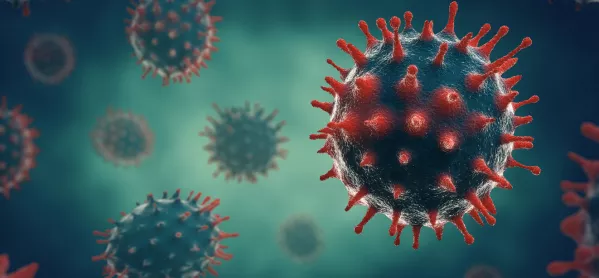Covid testing in schools: What do we know?

The Department for Education has paused a major part of its programme for Covid testing in schools because health experts have warned of risks of continuing.
However the government has said it remains committed to Covid testing taking place in schools.
So what is still happening and what has stopped? Here’s everything you need to know.
Exclusive: Public health directors warn against using rapid Covid tests on contacts of virus cases
Warning: Most schools not finding a single Covid case using rapid tests
Pause: Daily testing of close contacts of Covid cases put on hold over concerns about the risk involved
Daily contact Covid testing in schools has been paused
Until now the DfE has been telling secondary schools, special schools and colleges to use rapid lateral flow tests - which can give results in under 30 minutes - in three ways: to test pupils returning to school, to carry out weekly tests on staff and to do serial testing of anyone who has been in contact with a confirmed case of the virus.
Contacts were to be given a daily test for seven days and allowed to stay in school if they tested negative rather than being asked to self-isolate.
But the DfE has now paused this last part of the school testing programme after a recommendation by Public Health England and NHS Test and Trace.
They said that the higher transmission rate of the new variant of Covid meant the balance of the risk between this approach to testing resulting in people transmitting the virus and the benefit of face to face education were unclear.
Testing of staff and pupils in secondary schools will continue and be stepped up
However, the use of lateral flow tests in schools will continue.
Education secretary Gavin Williamson told schools today to test staff twice a week to help break transmission of Covid-19.
And Public Health England has said secondary schools should continue to test pupils twice upon return to school, as has been the case since the start of January.
Testing of primary school staff will be done from home
Primary schools are being sent testing kits to give to staff who will test themselves at home.
Guidance published earlier this week says this testing is not mandatory for staff and they do not need to provide proof of a negative test result to attend school or nursery in person, although participation in testing is strongly encouraged.
The contact testing which is now being paused was not going to happen in primary schools anyway.
The Medicine Healthcare products Regulatory Agency (MHRA) has not approved the use of rapid lateral flow Covid tests as a “self-test device for ‘serial testing’ for school pupils who have been exposed to a confirmed positive Covid case that would enable them to attend school as normal”.
This means tests done at home could have not been used to allow close contacts of Covid to remain in school if they tested negative.
The DfE is working on plans for primary school pupils to be tested at home but these are yet to be published.
What did the DfE want to achieve through Covid contact testing?
A senior DfE adviser told MPs yesterday that the aim of using rapid Covid tests on contacts of confirmed cases of the virus was to improve attendance during the pandemic.
Dougal Hargreaves, the DfE’s deputy chief scientific advisor said there was a “strong feeling” that during the last term Covid cases were resulting in too many pupils missing school as a result of having to self isolate.
But he also admitted that keeping close contacts of Covid cases in school if they test negative carried a potential risk of increasing transmission of the virus.
Why was the daily testing of Covid contacts so controversial?
There have been concerns from school leaders, public health officials and some scientists that the DfE plan would result in more Covid cases in schools because people with the virus would remain in school on the basis of false negatives.
Tes revealed on Friday that public health directors had advised schools not to use the tests in this way and to continue instructing close contacts of the virus to self-isolate.
Tes also revealed that the Association of School and College Leaders had called for the contact tests to be paused and highlighted concerns among a group of heads that the tests could be missing cases of the virus.
Figures compiled by the WorthLess? Group of heads found that the vast majority of schools have not yet found a single case of Covid using these tests.
What happens next?
The Department for Education has said it is going to do further evaluation on using these tests to keep more pupils in school.
A spokesperson said that contact testing would continue in some schools as part of this evaluation.
They added: “Daily contact testing, used as an alternative to up to a whole class having to isolate if a positive case is detected, continues to have the potential to be a valuable tool to keep more young people and staff at school, the best place for students’ development and wellbeing.
We will continue pilots to gather further data and to build the evidence base for the programme.”
You need a Tes subscription to read this article
Subscribe now to read this article and get other subscriber-only content:
- Unlimited access to all Tes magazine content
- Exclusive subscriber-only stories
- Award-winning email newsletters
Already a subscriber? Log in
You need a subscription to read this article
Subscribe now to read this article and get other subscriber-only content, including:
- Unlimited access to all Tes magazine content
- Exclusive subscriber-only stories
- Award-winning email newsletters